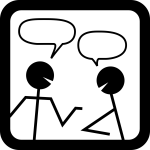…any appeal to Scripture is an appeal an interpretation of Scripture. The only question is: whose interpretation? When we are faced with conflicting interpretations of Scripture, we cannot set a Bible and ask it to resolve our differences of opinion as if it were a Ouija board. In order for Scripture to serve as an authority at all, it must be read, exegeted, and interpreted by someone.
As a Catholic, I wholeheartedly agree with the above statement. Now, some readers may incorrectly assume that the quote is coming from some Catholic apologetic work against the foundational doctrine of Protestantism, sola scriptura. Such an assumption proves false. Interestingly enough, the above quote comes from one of the best modern defenses of the Protestant doctrine of sola scriptura: The Shape of Sola Scriptura by the Calvinist theologian Keith Mathison. In it, Mathison agrees that proper interpretation requires a church to authoritatively interpret Scripture. However, the said church possesses no means of infallibility and therefore may err in her interpretation of Scripture. If errors arise, she then requires self-correction “according to the final and perfect standard of Scripture.”
I hope the reader sees the glaring circularity problem in Mathison’s paradigm.
- Mathison correctly states that any appeal to Scripture is an appeal to an interpretation of Scripture.
- Moreover, the Scriptures also require a legitimate authority to properly read, exegete, and interpret them.
- Unfortunately, when Mathison appeals to the “standard of Scripture,” he fails to see that such an appeal falls in the category of “any appeal.”
- Therefore, any attempt at self-correction that appeals to Scripture ultimately appeals to an interpretation of Scripture. “The only question is: whose interpretation?” Mathison’s paradigm, the paradigm of sola scriptura, offers no escape from this circularity.
Allow me to highlight the above circularity problem by referencing two examples: the first involving the Protestant Reformer, John Calvin, followed by the recent debate between Dr. James White and Catholic apologist (and former lawyer) Joe Heschmeyer.
John Calvin’s Letter to Cardinal Sadoleto (1539)
In 1538, John Calvin found himself expelled from the Swiss city of Geneva. In response, Cardinal Jacopo Sadoleto, the archbishop of Carpentras, sent a letter to the towns inhabitants in hopes of returning them to the Catholic Church. The town elders, in turn, requested the exiled Calvin to respond to the cardinal. Calvin, acquiescing to their request, wrote back to Cardinal Sadoleto a defense of the Reformation. Ultimately, Calvin rests his case in the below appeal to Scripture as the final authority.
For, although we hold that the Word of God alone lies beyond the sphere of our judgment, and that Fathers and Councils are of authority only in so far as they accord with the rule of the Word, we still give to Councils and Fathers such rank and honor as it is meet for them to hold, under Christ. [emphasis added]
Translation: only when Church Fathers (like St. Augustine) and Church Councils (like Nicaea) harmonize with Scripture do reformers like Calvin accept them as authorities. Here, Calvin conducts a problematic maneuver in his appeal to Scripture. Remember, any “appeal to Scripture is an appeal an interpretation of Scripture.” Moreover, with Mathison, we must ask Calvin: “whose interpretation?” Clearly, given that Calvin wrote this letter, the answer is Calvin. Therefore, given Mathison’s valid claim regarding “any appeal to Scripture is an appeal an interpretation of Scripture,” we must understand Calvin’s meaning as:
Fathers and Councils are of authority only in so far as they accord with [John Cavlin’s interpretation] the rule of the Word…
What makes John Calvin a legitimate authority to interpret the Scriptures? Did he possess a greater intellect or greater access to the Holy Spirit than Catholics (or other Protestants) with whom he disagreed? Did Calvin possess a Ouija board, or a sort of oracle, that helped him raise his own interpretation above that of others? No. John Calvin, in his appeal to Scripture, merely appeals to his interpretation of Scripture. He cannot break the interpretive circle.
Dr. James White and Joe Heschmeyer Debate: “Is Mass a Propitiatory Sacrifice?”
On March 1st, 2025, Dr. James White and Catholic Answers apologist Joe Heschmeyer conducted a debate on whether the Mass constituted a propitiatory sacrifice. I highly recommend all readers, especially Christian readers, take the time to watch/listen to this debate. For our purposes, let’s focus on an exchange between Dr. White and Joe during the cross-examination segment. For context, Dr. White questions Joe’s ability to interpret Scripture without the lens of his Catholicism. Below, I provide a key part of the exchange.
Dr. White: Would you agree that any and all of the interpretations that you have given to us already this evening, whether it be Malachi or Isaiah, or anything else, that these are your personal interpretations? Have any of these verses been infallibly defined by the Church of Rome?
Heschmeyer: This is not a debate about infallibility. What I’m arguing is that Malachi was understood by the early Christians as being about the sacrifice of the mass and I gave several citations from 180. That’s not my personal interpretation… All of your speech was your personal read of Hebrews.
Dr. White: Right…
Dr. White continues.
Dr. White: Is it even slightly possible, Joe, that there is a lens through which you are reading the New Testament that is given to you by the authority of the church that then claims to produce the priests that then perform the mass?
Heschmeyer: Absolutely. I mean, I would hope so.
Joe then proceeds to quote from Mathison’s book (the quote at the beginning of this article) that any appeal to Scripture is an interpretation of Scripture. Finally, Joe questions Dr. White’s interpretation of the Epistle to the Hebrews (the crux of Dr. White’s entire argument) as merely his opinion. Joe claims, and correctly so, that the best Dr. White offers regarding Hebrews is his opinion of Hebrews. Moreover, when Dr. White pushes back at Joe for an objectively clear meaning to Scripture beyond mere subjective opinion, Joe responds:
[The] meaning of scripture is objective. Our access to the meaning is inherently [subjective]. By that I mean literally by what the word subjective means. The subject accesses the objective meaning and so there’s room for misinterpretation.
Eventually, Dr. White gives up when Joe catches him in an informal fallacy. I recommend you watch the whole exchange. Interestingly, in Dr. White’s attempt to question Joe’s interpretation, he opens his own interpretation to Mathison’s circularity problem.
Final Thoughts…
As I wrote this piece, this line from the movie, The Big Lebowski, kept popping into my mind. If I read Keith Mathison correctly, any appeal to Scripture is an appeal to an interpretation of Scripture. So, when reading John Calvin or watching Dr. James White, ANY appeal they make to Scripture is an appeal to their own interpretations of Scripture. In other words, we only get the opinions of Calvin and Dr. White concerning what they think Scripture teaches, not the objective meaning of Scripture. To quote Heschmeyer with added context, “The subject [Calvin and Dr. White] accesses the objective meaning [of Scripture] and so there’s room for misinterpretation.” So, again Mathison, Calvin, and Dr. White leaves us with the same question: “whose interpretation?”
This paradigm, the paradigm of sola scriptura, offers no escape from the circularity it created.
Thank you!
If you liked this article, please leave your comments below. I am very interested in your opinion on this topic.
Read The Latin Right’s other writing here.
Please visit my Facebook page and IM your questions (and follow my page) or topics for articles you would like covered.
Also, please subscribe my YouTube page for updates on upcoming articles.












